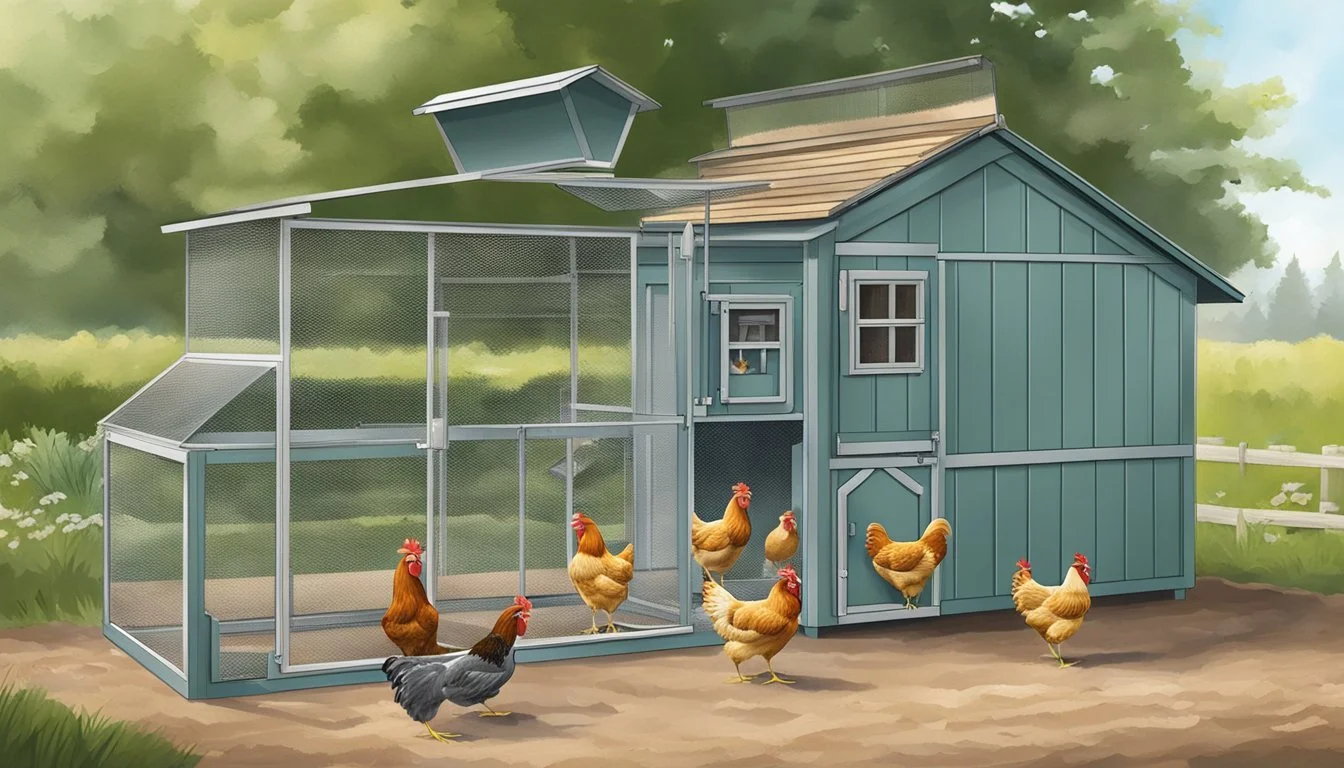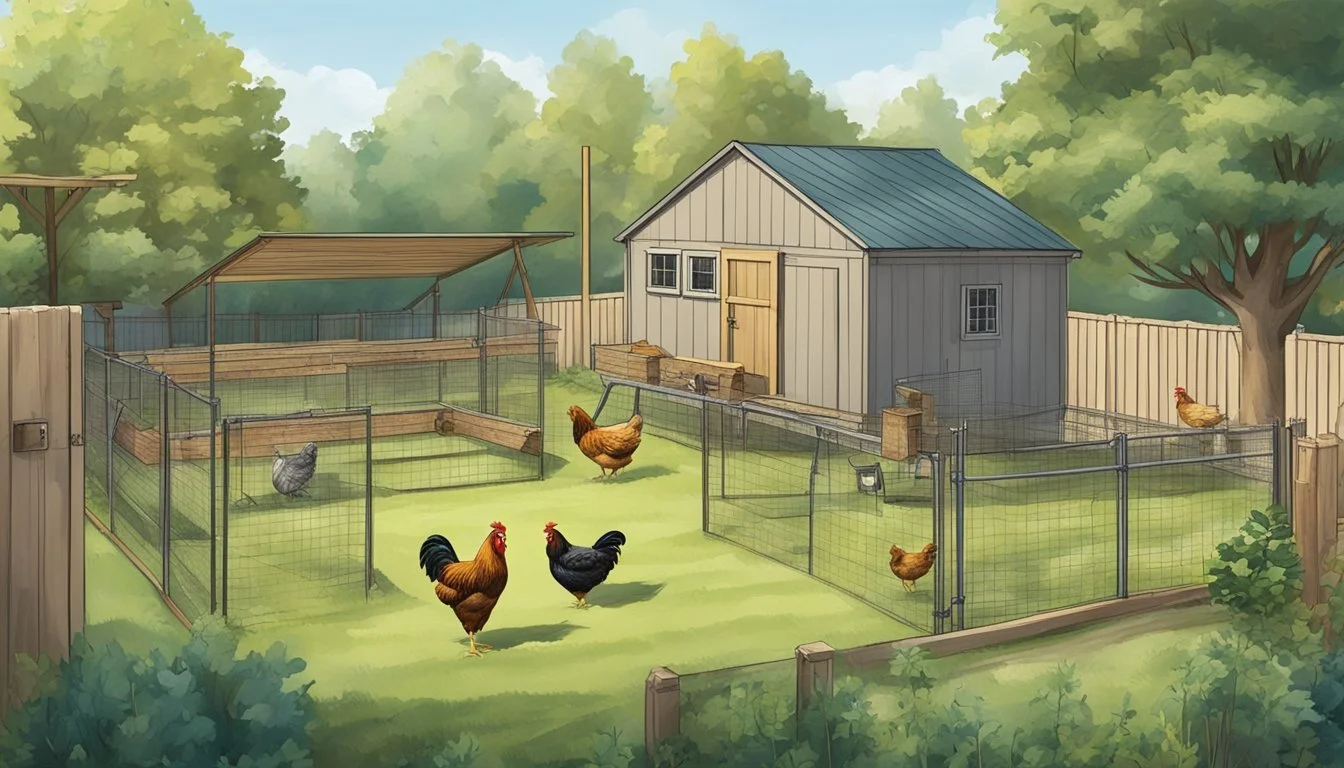Keeping Backyard Chickens in Billings, MT
A Practical Guide to Urban Poultry Farming
Maintaining a flock of backyard chickens offers residents of Billings, Montana, an opportunity to engage in sustainable living practices while enjoying fresh eggs. Adhering to city regulations is critical for any resident considering this venture. The city of Billings allows the keeping of up to six hens per lot, offering a harmonious balance between urban living and small-scale poultry farming, though it's important to note that roosters are not permitted to ensure neighborhood tranquility.
To legally keep chickens in Billings, individuals must obtain chicken permits, as outlined by the Urban Chicken Ordinance 12-5580. This process includes specific requirements designed to minimize disturbances and health risks. Additionally, coop placement is regulated to preserve neighborly relations; coops must be situated at least 10 feet from property lines, and slaughtering of chickens must be conducted away from public view and adjacent properties.
By observing these regulations, Billings residents can successfully integrate backyard chickens into their urban lifestyle. The city's approach reflects an understanding of the need for balance between the benefits of raising chickens and the potential concerns of residents, ensuring that chicken keepers and their neighbors can live in close proximity without issue.
Legal Considerations for Keeping Chickens
In Billings, Montana, residents interested in raising backyard chickens must navigate city ordinances, state laws, and specific permit requirements. Adhering to zoning and property regulations is also crucial to legally keep chickens within the city limits.
Billings Chicken Ordinances
The Billings City Council has established ordinances to regulate the keeping of backyard chickens. Urban Chicken Ordinance 12-5580 lays out the rules within Billings. Key points include limitations on the number of chickens one can own and the prohibition of roosters to prevent noise disturbances. It's imperative to be familiar with these local ordinances to legally keep chickens in the city.
Montana Chicken Laws
Beyond Billings, the state of Montana has its own set of regulations concerning the keeping of poultry. These state laws complement local ordinances and must be followed accordingly. They address broader aspects of animal husbandry, including the overall health, safety, and welfare of the chickens, and may also cover issues like shelter standards and disease control.
Permit Requirements
To keep backyard chickens legally in Billings, residents must obtain the necessary annual permit. The permit process typically involves a check to ensure compliance with local ordinances, such as proper coop construction and placement. Animal Control of the Billings Police Divisions oversees the issuing of chicken permits, and understanding this process is crucial for anyone considering raising chickens within the city.
Zoning and Property Regulations
Zoning by the Zoning Commission dictates where within Billings chickens can be kept, focusing on whether a property is zoned for agricultural or residential use. Certain regulations may restrict chicken coops in front yards or dictate the distance a coop must be from neighboring homes or properties. This is to maintain aesthetic standards and minimize potential neighborhood conflicts. It's important to check these zoning regulations before setting up a coop to ensure it is positioned on the property legally.
Setting Up Your Chicken Coop
Setting up a chicken coop in Billings, MT, requires attention to location selection, structural features, and installation of nesting boxes and roosts to create a secure and comfortable environment for chickens.
Choosing the Right Location
The location of a chicken coop is crucial to ensure the health and safety of the chickens. It should be placed on high ground to avoid flooding and provide good drainage. There must be a minimum distance from the property line, adhering to local regulations. The coop should also have direct sunlight exposure to deter pests and maintain a dry environment.
Coop Construction and Features
A chicken coop should be robust, with predator-proof features such as secure latches and wire mesh windows. Ventilation is essential to prevent respiratory issues, so include vents or windows that can be opened or closed depending on the weather. The structure should keep chickens safe from predators while providing shelter from the elements.
Walls and Roof: Thick, insulated materials for temperature control.
Floors: Easy to clean, sloped for drainage.
Doors: Proper seals to exclude drafts and pests.
Nesting Boxes and Roosts
Install nesting boxes in a darkened area of the coop to encourage egg-laying. They should be filled with comfortable bedding and easily accessible for cleaning. Roosts are vital for nighttime perching and should be placed higher than nesting boxes, allowing enough space for each chicken to roost comfortably.
Nesting Boxes: 1 box per 4-5 hens, at least 10 inches cubed.
Roosts: 8-10 inches per chicken, 2 feet above the ground or floor.
Chicken Care and Management
When raising chickens in Billings, Montana, it is essential to understand the different aspects of chicken care. Adequate knowledge of breed selection, proper feeding, and disease management is crucial for a healthy flock.
Selecting Chicken Breeds
The choice of chicken breeds should be based on local climate adaptability, egg production, and purpose (meat, eggs, or both). In Billings, cold-hardy breeds like Plymouth Rocks and Wyandottes are well-suited for local weather conditions. When selecting pullets, consider the bird's temperament and space requirements to ensure they adapt well to backyard settings.
Feeding and Nutrition
Chickens require balanced nutrition to maintain health and high productivity levels. A typical diet includes:
Starter Feed: High in protein to aid in growth, appropriate for chicks up to 8 weeks old.
Grower Feed: Moderately high protein content, designed for pullets from 8 weeks until they begin laying eggs.
Layer Feed: Optimal for laying hens, lower in protein but enhanced with calcium for egg production.
Grit: Helps with digestion and is essential, especially if your chickens are not free-range.
Scratch Grains: A treat for chickens that can motivate foraging behavior but should not replace their primary diet.
Additionally, ensure clean, fresh water is available at all times.
Health and Diseases
Preventive measures are necessary to keep chickens free from diseases, which include practicing good hygiene, providing proper nutrition, and ensuring vaccinations are up to date. Common poultry diseases to be aware of include Marek's disease, avian influenza, and coccidiosis. Regular health checks can help identify issues early on, and isolating sick birds is vital to prevent the spread of diseases. Consulting with a local veterinarian who is familiar with avian health is advisable for proper disease management strategies.
Community Considerations
When keeping backyard chickens in Billings, MT, residents must navigate local ordinances and be mindful of their impact on the community. Addressing noise, waste management, and understanding how to handle complaints and fines are crucial for maintaining harmonious neighbor relations.
Noise and Neighbor Relations
Chickens are generally quiet, but roosters can cause significant noise disruption. Billings' ordinances prohibit excessive animal noise that disturbs neighbors. Residents should ensure their chickens are housed comfortably to minimize noise, and roosters may not be allowed under certain city regulations. It's vital to communicate with neighbors and address any concerns proactively to foster positive relationships.
Key Regulations:
Maintain a distance of coops from neighboring dwellings.
Restrict or exclude roosters to minimize noise.
Respond promptly to any noise complaints.
Waste Management and Sanitation
Properly handling chicken waste is not only a matter of sanitation but also a legal requirement in Billings. Animal Control mandates that owners prevent waste accumulation to deter odors and pests. A regular cleaning schedule is necessary, and composting chicken manure can be beneficial for gardens.
Waste Protocols:
Clean coops regularly to prevent odor and waste build-up.
Utilize proper waste disposal or composting methods.
Ensure waste management complies with health and sanitation ordinances.
Handling Complaints and Fines
Should issues arise, owners must be prepared to address complaints according to the city's code enforcement policies. Ignoring neighbor complaints can lead to fines or revocation of chicken permits. It's important that owners stay informed about the urban chicken ordinance, cooperate with authorities, and take corrective action if necessary.
Complaint Resolution:
Resolve issues before they escalate to formal complaints.
Adhere to the urban chicken ordinance.
Understand potential fines and penalties for non-compliance.
Protection Against Predators
In urban settings like Billings, MT, keeping backyard chickens safe is critical. Predators are a real threat, and chicken owners must employ practical and effective strategies to secure their livestock.
Identifying Potential Threats
Billings residents should be aware of various predators that can threaten urban chickens. Common threats include:
Mammals: raccoons, foxes, and weasels.
Birds of prey: hawks, owls, and eagles.
Rodents: rats and mice might not hunt chickens but can harm chicks and consume feed.
Each predator has unique methods of accessing chicken coops, necessitating customized defense tactics.
Implementing Security Measures
To safeguard chickens, residents must implement predator-proof measures:
Physical Barriers:
Secure fencing with fine mesh to deter snakes and rodents.
Enclosures should be topped and fully enclosed to protect from avian predators.
Use hardware cloth instead of chicken wire, which is robust against chewing and ripping.
Ensure coops are locked at night with predator-resistant latches.
Elevate the coop to prevent digging predators.
Sanitation:
Avoid accumulation of waste to not attract rodents or other predators.
Store feed in secure containers.
Adhering to these measures will significantly reduce the risk of predation, ensuring a safer environment for backyard chickens in Billings.
Ethical and Legal Slaughter
In Billings, Montana, residents who keep backyard chickens must adhere to specific regulations regarding the slaughtering of chickens. It is imperative to understand both legal requirements and humane methods to ensure ethical practices are followed.
Slaughtering Regulations
Local ordinances in Billings clearly outline the legalities of chicken slaughter for personal use. Residents are required to:
Conduct the slaughter within their property bounds.
Prevent any public nuisance or sanitation issues that may arise from the slaughter process.
The City of Billings mandates that individuals must dispose of waste and remains in accordance with city waste management regulations to prevent health hazards or buildup of organic waste which could attract pests or cause odor issues.
Humane Methods
When slaughtering chickens, Billings' residents have a responsibility to utilize humane methods. This ensures minimal distress and pain for the chickens. Key considerations include:
Quick and efficient methods, such as cervical dislocation or use of a sharp knife.
Proper restraint of the bird to minimize struggle and stress.
Immediate cessation of consciousness and insensibility to pain.
The utilization of humane methods is not only ethical but also aligns with animal welfare guidelines that responsible backyard chicken keepers must follow.
Additional Resources
In Billings, MT, individuals seeking to keep backyard chickens can access a variety of resources designed to provide guidance and community support. These resources range from local community groups to educational materials and workshops, each offering valuable information for both novice and experienced chicken keepers.
Local Chicken Keeping Communities
Local communities in cities like Missoula, Bozeman, Great Falls, Helena, and Kalispell offer support for backyard chicken enthusiasts. Residents of Billings can connect with regional groups to share tips, planning strategies, and get assistance with forms and local regulations. These communities often have online forums and social media groups where members can seek advice and share their experiences.
Missoula Urban Demonstration Project (MUD)
Facebook Page: A platform for chicken keepers in Missoula to exchange tips.
Bozeman Backyard Farmers
Local Meetups: Regular meetings to discuss urban farming, including chicken keeping.
Educational Materials and Workshops
For those looking to expand their knowledge, educational materials and workshops provide hands-on learning opportunities. They cover topics such as coop construction, chicken health, and local ordinances. Various organizations within Billings and neighboring cities offer these educational tools.
Montana State University Extension:
Workshops: Scheduled throughout the year, focusing on poultry care and management.
Publications: A selection of guides detailing best practices for keeping chickens in Montana's climate.
Billings Public Library:
Books and Resources: A collection of books on urban chicken keeping.
Seminars: Occasionally hosts seminars on urban agriculture, including chicken keeping.









